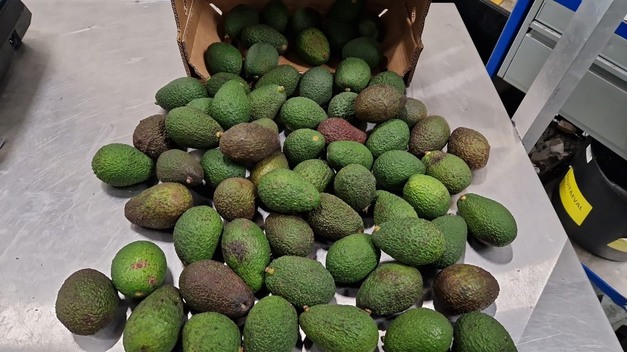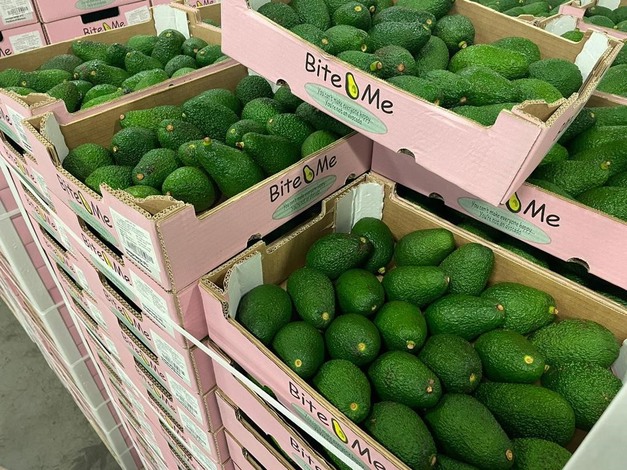"A true divide has developed between large and small avocados. Everyone wants big sizes and try to buy as few small ones as possible," says Mehdi Haddadi of Med Fruit Europe, a Dutch company whose focus includes Moroccan avocados. In mid-November, he saw that Morocco’s extreme weather conditions - including high temperatures and little rainfall during the flowering and growing period - had resulted in a primarily small-sized crop with quality issues. "The large supply of small sizes puts pressure on those categories' prices. The machines for those sizes are working overtime."

Mehdi has established that there is much demand for large caliber avocados. "The price for 12 to 18 sizes is stable now. We'll have to wait and see whether that remains so. First, baby avocado prices came under pressure, then size 24, and now sizes 22 and 20. It’s a cascading development. This could well lead to a lot of size 18 stock, which would put pressure on that category, too," he explains.
Weather conditions increasingly decisive
In mid-November, the trader did see the quality gradually improving. "There are more large sizes coming into the packing plant, and there should be a significant improvement from Morocco." Mehdi is keeping a cautious eye on that. "Still, quality and size distribution differ from previous years. Besides, you can't look very far into the season; anything can happen with the weather anywhere. The Israeli situation could affect the avocado supply, too. Weather conditions have become so decisive for supplies exported to Europe that it's difficult to outline avocado market expectations," he says.

Despite the quality problems, Mehdi did not anticipate a shortage of Moroccan avocados. "Growers planted plenty of avocados in recent years, so expect record harvests this year. Despite the effects of heat waves and storms shortly before harvesting, enough product is available. To make some money, Moroccan growers must, besides supplying the local market, export avocados."
Caution
Mehdi does foresee it becoming increasingly hard to fill programs, though, especially since the quality from Morocco does not usually prompt a search for alternatives. "When, say, the Kenyan season starts, you know it could be disappointing, and you must have a plan B. We're not used to that from Moroccan avocados, while the first arrivals are, indeed, disappointing," he admits. As a result, the market is noticeably cautious. "If a shipment includes too many small sizes, interest in the large sizes can also drop and the buyer can do nothing with the shipment. Market confidence is, thus, somewhat lacking."

Another consequence of the market conditions is that sorting requires more attention. "Much energy is needed for strict selection at the packing station in Morocco. We have to pack even more selectively, which requires steering. That's challenging because the quality's somewhat lesser than in previous years," says Haddadi.
On the demand side, the avocado market is excellent, he notes. "Demand remains; people are definitely not tired of avocados." The trader does, however, see a slight drop in demand in Europe around the festive season. "It's not a true holiday product like, for example, flown-in mangoes, passion fruit, or physalis," he continues.
Middle East is a growing market
In the Middle East, however, December is when there is an increased demand for avocados, and Mehdi says that area is a growing market. "We're doing more and more directly from Morocco to the Middle East for both sea and air freight." He adds that most clients in that region want ready-to-eat avocados, which is why Med Fruit Europe is investing in ripening cells in Morocco.
The trader is expecting good things from global avocado sales. "Consumption should still increase in several countries, such as China, which takes relatively few avocados." Besides increased consumption, Mehdi also sees lots of additional planting in many countries. Here, though, water is a thorny issue and why some plantations have even had to cease operations. "It remains to be seen how that will develop when weather conditions become more extreme and what the supply/demand situation will be," he concludes.
Medhi Haddadi Med Fruit Europe
Med Fruit Europe
+31(0)20 3343253
[email protected]
www.medfruit.nl
